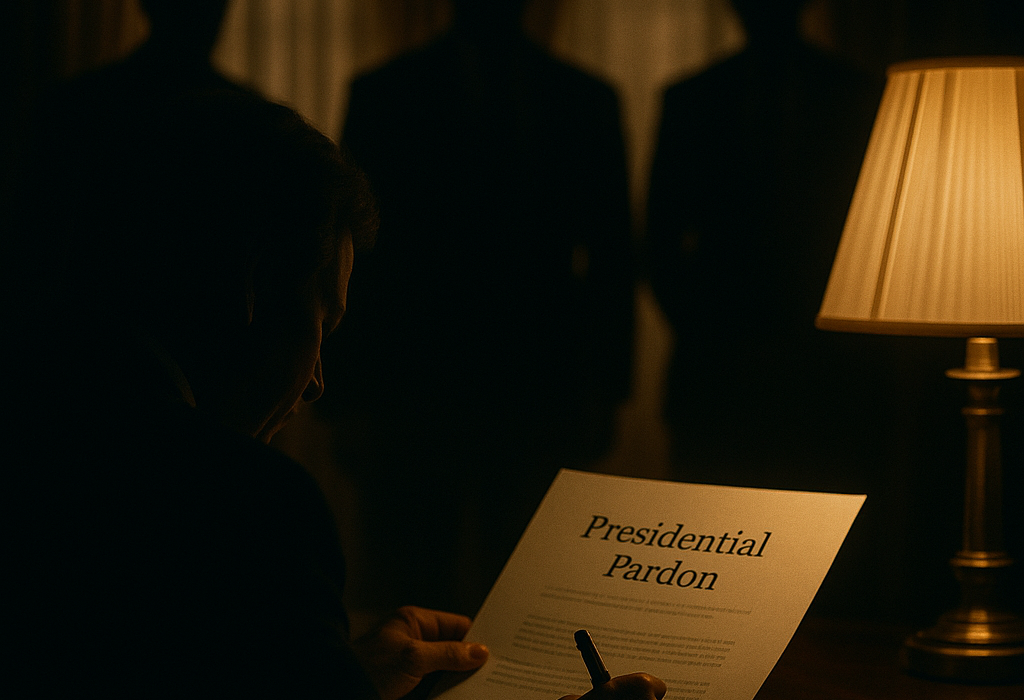On November 10, 2025, Trump issued “full, complete and unconditional” pardons to at least 77 individuals tied to his effort to overturn the 2020 election results, including prominent allies such as Rudy Giuliani, Sidney Powell, John Eastman, Mark Meadows, and Jeffrey Clark.These individuals were involved in the “fake electors” scheme or other efforts to challenge or reverse the 2020 outcome. The proclamation explicitly says it does not apply to Trump himself.
Correlations & Questions of Favoritism
- The pardons are almost exclusively given to political allies of Trump—those who actively supported his 2020 claims or worked for his campaign or transition. That strong overlap raises questions of partisan favoritism.
- Research from ethics groups shows that many of Trump’s clemency grants historically have gone to people connected to him or his allies, including some who made political contributions or had lobbying ties. For instance, one ethics-group analysis found that some pardoned individuals had donated to Trump-linked causes.
- However: There is no publicly verified evidence in the major press (as of this time) of a direct quid-pro-quo (i.e., documented bribery in exchange for a pardon) in this specific 2025 set. Many pardons included individuals not federally charged, so the legal leverage point is weaker.
- Because presidential pardons cover federal crimes only, many of those pardoned still face state prosecutions (e.g., in Georgia, Arizona). The presence of ongoing state cases means that federal clemency may serve as partial protection or deterrent, but does not end all legal risk.
Broader Implications
- Legitimacy: The pattern of pardons being concentrated among political allies raises concerns about the fairness and impartiality of the clemency process. That arguably undermines the perception of equal justice under law.
- Governance and precedent: The scale and timing of the pardons (close to an election, related to efforts to overturn a previous election) may set a precedent for how future presidents use clemency—not only as a tool of mercy—but as a political instrument.
- Legal strategy: By pardoning co-actors or close allies in efforts to overturn an election, the president potentially reduces future federal exposure for them and signals to others that loyalty may be rewarded.
- State-vs-federal consequences: Because many prosecutions are state-level, federal pardons may shift pressure back to state jurisdictions — which raises questions about coordination or conflict between state and federal prosecutorial priorities.
Projections
- Short term: Expect intensification of scrutiny—both from congressional oversight and state prosecutors—into the pardons, especially where state charges remain.
- Mid term: There may be legal reforms proposed (by Congress or state legislatures) to enhance transparency in pardon grants, to avoid apparent conflicts of interest.
- Long term: If political-ally-focused pardons become more common, public trust in the executive clemency system could erode, possibly prompting courts or states to challenge pardons or push for legislative constraints.
References
- Reuters: “Trump pardons Giuliani, others accused of seeking to overturn 2020 election loss.” Reuters
- Time: “Trump Pardons Rudy Giuliani and Others Who Backed Efforts to Overturn 2020 Election.” TIME
- Washington Post: “In Symbolic Move, Trump Pardons 77 Allies Who Tried to Steal 2020 Election for Him.” The Washington Post
- Democracy Docket: “In Symbolic Move, Trump Pardons 77 Allies Who Tried to Steal 2020 Election for Him.” Democracy Docket
- PBS NewsHour: “A look at Trump’s controversial pardons for political allies and loyalists.” PBS
- Ethics Report (Citizens for Ethics): “Trump has granted clemency to 17 corrupt politicians—so far.” CREW
- Washington Post Opinion: “‘No MAGA left behind’: The trouble with Trump’s pardons.” The Washington Post
